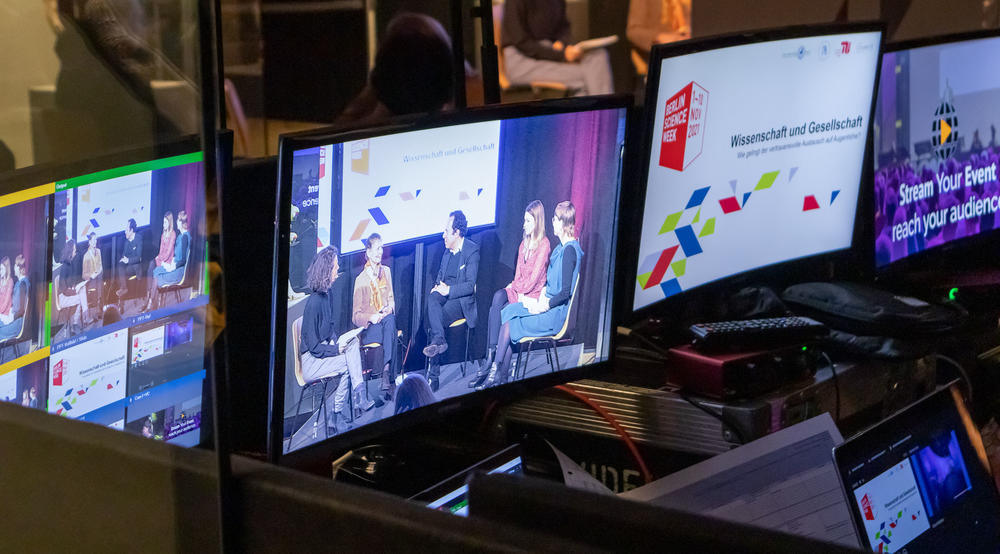The BUA at the Berlin Science Week
From the future of healthcare to the role of clubs for open societies - recordings of BUA events at Berlin Science Week 2021
Ten days dedicated to science: From November 1 to 10, 2021, researchers and stakeholders from politics, society and science exchanged information about current research and discussed their role in meeting the challenges of our time at more than 500 events during Berlin Science Week. The Berlin University Alliance (BUA) and its partners Freie Universität Berlin, Humboldt-Universität zu Berlin, Technische Universität Berlin, and Charité – Universitätsmedizin Berlin also participated with their own events.
Wissenschaft und Gesellschaft
Wie gelingt der vertrauensvolle Austausch auf Augenhöhe?
The great and complex challenges of our time can only be solved through cooperation and exchange between science and society and across disciplinary boundaries. Art and culture, politics and business often ask similar questions to science, but come at them from different methodological and professional perspectives. Citizens, in turn, bring very different perspectives and experiences to the discourses.
Experts from science and society discussed this with BUA spokesperson and president of Humboldt-Universität zu Berlin Prof. Dr.-Ing. Dr. Sabine Kunst.
The Dance Floor is a Political Space!
A Knowledge Exchange on the Role of Clubs for Liberal and Open Societies
In recent years, Berlin and other comparable cities have sounded the alarm over the disappearance of alternative spaces and clubs as a symptom of a fundamental change in urban society. Gentrification, housing shortages, rising rents and changing demographics make it more and more difficult to find and maintain places that can serve as retreats for artists and marginalized communities alike. Often, however, such places are experimental spaces for social utopias, alternative forms of coexistence and interaction. In addition, they are places for innovation: culturally, technologically and socially.
Researchers of the Cluster of Excellence “Contestations of the Liberal Script – SCRIPTS” and the Berlin Clubcommission as well as actors from the arts and culture scene discussed these topic to foster an intersectoral knowledge exchange between theory and practice, between science and society.
The Transformative Effect of Science
A joint event of the Berlin University Alliance and the European Research Council (ERC)
Since the start of the Scientific Revolution nearly five centuries ago our understanding of the world and our ability to manipulate it have massively increased. This has led to huge improvements in our capacity to harness energy, produce material goods, fight diseases and feed a rapidly growing population. Life expectancy and quality of life have greatly increased in many places and we have newfound abilities to travel and communicate across the world unimaginable to our ancestors.
Prof. Dr.-Ing. Dr. Sabine Kunst, president of Humboldt-Universität zu Berlin and spokesperson for the Berlin University Alliance (BUA), warmly welcomed Prof. Dr. Maria Leptin, President of the European Research Council (ERC), to Berlin. For Maria Leptin provided insight into her ideas for the ERC, explained why basic research is essential for research and how it contributed to the transformation of research and society. ERC grantees from the four network partners presented how their projects have a transformative effect.
The Future of Health Care for Older Adults Living in Urban Areas
Worldwide, humans live longer, thus, the share of older adults increases. This leads to a shift in health care from acute diseases to chronic conditions and long-term care. Parallel, people live increasingly in urban areas. Population density and heterogeneity are high in urban areas; traditional family structures are less common. This poses challenges to the future of health care for older adults living in urban areas.
In this interactive workshop, we discussed preliminary results from our project in the framework of the strategic partnership between the Berlin University Alliance and the National University of Singapore on health and social care needs of older adults living in urban areas.

